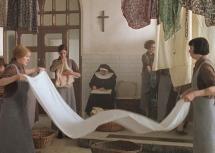Report to Reveal Magdalene Laundry Responsibility
Scotsman
VICTIMS of Catholic-run workhouses in Ireland have rejected a government apology for the incarceration of thousands of women in the Magdalene laundries. As an inquiry found that 2,124 of those detained in the institutions were sent there by the state, campaigners accused Taoiseach Enda Kenny of a “cop-out”. Records have confirmed that 10,012 women spent time in the laundries between 1922 and 1996. Pressure groups Justice for Magdalenes and Magdalene Survivors Together insisted that thousands of women forced into slavery and torture deserved a full state apology and compensation. Mari Steed, whose mother, Josephine Murphy, was in a laundry in Sunday’s Well, Cork, when she was adopted by a family in in the United States, described the government’s response as “horrifying”. She said: “What we witnessed today was absolutely shameful – I can’t recall ever being so angry.” The committee investigating the state’s involvement in Magdalene laundries identified five areas of direct involvement in the detention of women in ten institutions run by nuns: • They were detained by courts or police, transferred by reform schools, rejected by foster families, orphaned, abused, mentally or physically disabled, homeless teenagers or simply poor. • Inspectors, known by the women as “the suits”, routinely checked that conditions complied with rules for factories. • The government paid welfare to certain women in laundries, along with payment for services. • Women could leave laundries if they moved to other state-run institutions, such as psychiatric hospitals or county homes, or were in the company of police, probation or prison officers. • Deaths were officially registered. The vast majority were recorded, but names may have been recorded under a variation. The Irish premier’s apology yesterday stated: “I’m sorry that this release of pressure and understanding of so many of those women was not done before this, because they were branded as being the fallen women, as they were referred to.” No compensation package has been finalised, but it is understood a redress is being put in place. Maureen Sullivan, of Magdalene Survivors Together, rejected Mr Kenny’s apology, and demanded an apology from the state and religious orders for taking her education, name and childhood from her. “That is not an apology,” he said. “He is the Taoiseach of the Irish people, and that is not a proper apology.” Katherine O’Donnell, a University College Dublin researcher attempting to catalogue experiences in the laundries, described the apology as “bizarre, a half-hearted acknowledgment and mealy-mouthed”. The 18-month inquiry, headed by outgoing senator Martin McAleese, husband of former Irish president Mary McAleese, interviewed just over 100 surviving women, about 1 per cent of the official total. Mr McAleese said he wished to speak to more, but women were still reluctant to admit to their time in laundries or recall their experiences. Many emigrated, others have kept their stories secret from families and some are too old or infirm to speak. The Sisters of Our Lady of Charity ran laundries at Drumcondra and in Dublin; the Sisters of Mercy in Galway and Dun Laoghaire; the Religious Sisters of Charity – the only order to offer an unreserved apology – in Donnybrook, Dublin, and Cork; and the Sisters of the Good Shepherd in Limerick, Cork, Waterford and New Ross. The last laundry, in Dublin, closed in 1996. Justice for Magdalenes is aware of at least 988 women who are buried in laundry plots in cemeteries across Ireland. The inquiry reported a cold, harsh, physically demanding environment with a rigid, uncompromising regime of work and prayer. Verbal and psychological abuse was common, along with the deep hurt the women felt at their loss of freedom, the report found. CASE STUDIES ‘The nuns have destroyed my life’ Lauren Sullivan was taken to the Good Shepherd Magdalene Laundry in New Ross, Co Wexford, at the age of 12. “I WAS taken from my school in Co Carlow and placed in the Magdalene Laundry at New Ross against my will. I was told that this place was going to further my education but that never happened. By day I would work in this laundry but by night I would sleep in St Aidan’s Industrial School. “It was long, hard tedious work and because I was small, they made a timber box so I could feed the sheets into the cauldron. “I remember being hidden in a tunnel when the school inspectors came. I can only assume that this was due to the fact that I should not have been working in the laundry. “The nuns have destroyed my life and they never allowed me to develop as a young girl.” ‘I never thought I’d get out of there’ “Living in that place made my life hell. It was a living nightmare and what scared me most was I never thought I’d get out of there. “You worked in the morning, you worked in the evening. The only time you know the time was when the bell rang. “I had my hair chopped off and my name changed, and when I was put into that Magdalene laundry all I remember was the door being locked.” ‘They beat, punched and tortured me’ “The worst was the Mercy Convent in Galway. The nuns in there were lethal. “They beat, punched and tortured me in such a way that I have never been able to recover fully since. “My time in the laundry was spent doing cleaning. I got no education at all in there. “I tried to escape once, but I was brought back by the Guards. “There are no other words to describe these places other than sheer hell-holes. It was worse than prison.” ‘My name was changed to No 27’ Kathleen Legg was 14 when she was taken to St Mary’s Training Centre, Stanhope Street, Dublin, run by the Irish Sisters of Charity. At 77, she was one of the oldest survivors campaigning for an apology: “I remember my mother carrying me through the fields of Lisvernane to Dublin. “I was told like all the other girls that I was going to further my education. This was sadly not the case. I had my name changed and I was called No 27. “At six o’clock the bell would go. You answered to the bell, as you did not know the time. We didn’t even have a book. It was all prayer and silence. I worked every day in the laundry. “The nuns intimidated me so much that I lost all self-belief. I have struggled for years. “They robbed me of my life, and years later I found out that they robbed me of the life I could have given to others. Due to the heavy lifting I did at that institution, I was impeded from having my own children.”
|
.
Any original material on these pages is copyright © BishopAccountability.org 2004. Reproduce freely with attribution.

